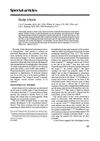Search
for
Sort by
Research
870-900 / 1000+ results
research Frontal Fibrosing Alopecia: A Disease Fascinating for the Researcher, Disappointing for the Clinician and Distressing for the Patient
Frontal Fibrosing Alopecia is a poorly understood condition that is hard to treat and causes distressing hair loss.

research Comprehensive Overview of Hidradenitis Suppurativa
The document concludes that lifestyle changes and medical treatments can significantly reduce symptoms of Hidradenitis Suppurativa, a chronic skin condition.

research British Society for Pediatric Dermatology Annual Meeting, Sheffield, 18-19 November 2016
The meeting highlighted the importance of genetic testing and multidisciplinary approaches in pediatric dermatology.

research Scalp Whorls
Abnormal scalp whorls can indicate brain development issues but may also be seen in neurologically normal people.
research Polymorphisms in the Human High Sulfur Hair Keratin-Associated Protein 1, KAP1, Gene Family
Genetic variations in hair keratin proteins exist but don't significantly affect hair structure.
research Prevalence and Treatment of Alopecia Areata in Taif Area, KSA
Alopecia areata in Taif is common, mainly immune-related, and best treated with topical corticosteroids and vitamins.
research Genetic Disorders and Defects in Vitamin D Action
Two rare genetic diseases cause severe rickets in children due to defects in vitamin D metabolism.

research Adrenal 21-Hydroxylase Gene Mutations in Slovenian Hyperandrogenic Women: Evaluation of Corticotrophin Stimulation and HLA Polymorphisms in Screening for Carrier Status
The study concluded that testing hormone levels after stimulation is not reliable for identifying carriers of 21-hydroxylase deficiency; genetic testing is necessary.

research PCSK9: From Nature's Loss to Patient's Gain
Certain genetic mutations can lower bad cholesterol and reduce heart disease risk, leading to effective cholesterol-lowering drugs.

research Molecular Basis of Androgenetic Alopecia: From Androgen to Paracrine Mediators Through Dermal Papilla
Male pattern baldness involves hormones and cell signals affecting hair growth.

research Ferreting Out Stem Cells From Their Niches
New methods have greatly improved our understanding of stem cell behavior and roles in the body.
research Defects in Androgen Biosynthesis Causing 46,XY Disorders of Sexual Development
Genetic defects in androgen production are linked to male developmental disorders and are improving treatment understanding.

research Analysis of Pediatric Dermatology Inpatient Consultations in a Pediatric Teaching Hospital
Most hospitalized children with skin issues were boys, with allergic skin diseases like atopic dermatitis being most common, and treatments were usually topical.

research Field Cancerization: From Molecular Basis to Selective Field-Directed Management of Actinic Keratosis
Photodynamic therapy is the preferred treatment for skin precancer due to its effectiveness and safety.
research Female Pattern Hair Loss: An Update
Female pattern hair loss has multiple causes and treatments, with new therapies showing promise.

research Identification of a Novel Missense Mutation in the Fibroblast Growth Factor 5 Gene Associated with Long Hair in the Maine Coon Cat
A new gene mutation causes long hair in some Maine Coon cats.

research Eyebrow Loss
Eyebrow loss has many causes and requires accurate diagnosis for proper treatment.
research Progress in Research and Prospects for Application of Precision Gene-Editing Technology Based on CRISPR-Cas9 in the Genetic Improvement of Sheep and Goats
CRISPR/Cas9 gene-editing shows promise for improving sheep and goat breeding but faces challenges with efficiency and accuracy.

research Intralesional Betamethasone as a Therapeutic Option for Alopecia Areata
Betamethasone can effectively treat alopecia areata.

research Male Pattern Androgenetic Alopecia
Androgens contribute to common male hair loss; more research needed for hair growth medication.

research The Rotterdam Study: 2012 Objectives and Design Update
The Rotterdam Study updated its design and objectives in 2012, providing insights into various diseases in the elderly, including skin cancer, bone health, liver disease, neurological and psychiatric conditions, and respiratory issues.

research Hair Loss in Women: Comprehensive Overview and Treatment Options
Effective hair loss treatment in women requires correct diagnosis and can include medications like minoxidil, antiandrogens, and treatments for underlying conditions like PCOS.

research Editorial: Advances in Evaluation and Management of Hair Loss Disorders
Early diagnosis and personalized treatments are crucial for better hair loss management.

research Premature Greying of Hair (Premature Canities): A Concern for Parent and Child
Genetics, stress, and health issues can cause early hair greying, which affects self-esteem, and there's no cure, only hair dye.

research The Role of Candidate Pharmacogenetic Variants in Determining Valproic Acid Efficacy, Toxicity, and Concentrations in Patients with Epilepsy
Genetic variants can affect valproic acid's effectiveness, side effects, and levels in epilepsy treatment.

research Androgen Receptor Polymorphisms (CAG Repeat Lengths) in Androgenetic Alopecia, Hirsutism, and Acne
Shorter CAG repeats may cause hair and skin issues, while longer ones may link to acne.

research Identification of a Recurrent Nonsense Mutation in HR Gene Responsible for Atrichia with Papular Lesions in Two Kashmiri Families
A mutation in the HR gene causes a rare form of irreversible hair loss in two Kashmiri families. Whole exome sequencing is effective for finding such mutations.

research Mutant Laboratory Mice With Abnormalities in Hair Follicle Morphogenesis, Cycling, and Structure: Annotated Tables
Mutant mice help researchers understand hair growth and related genetic factors.
research Molecular Mechanisms Regulating Hair Follicle Development
Understanding hair follicle development can help treat hair loss, skin regeneration, and certain skin cancers.